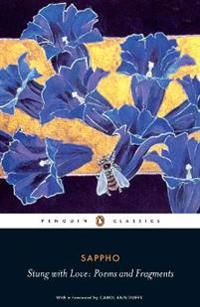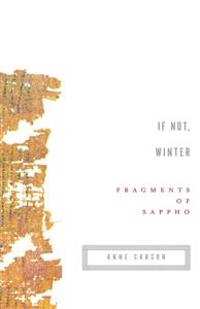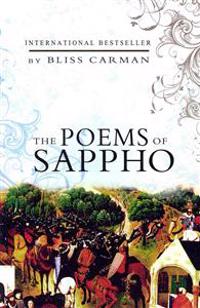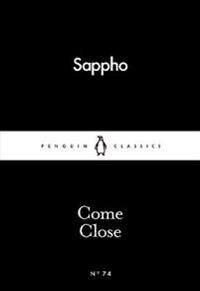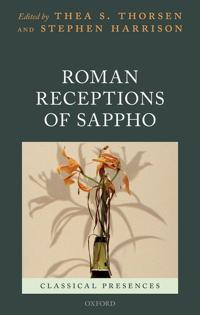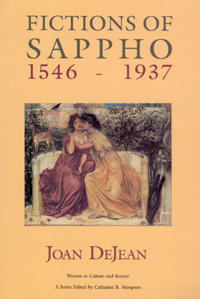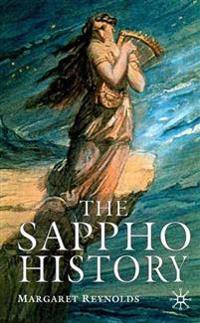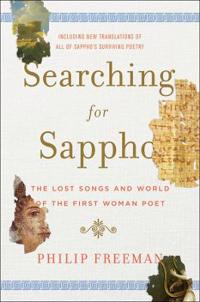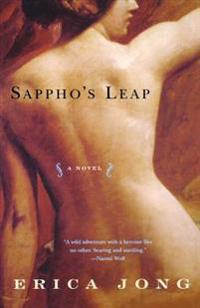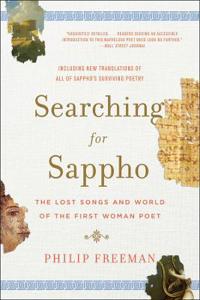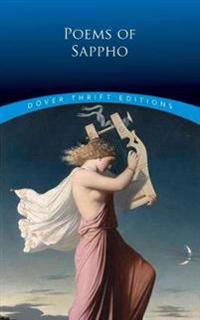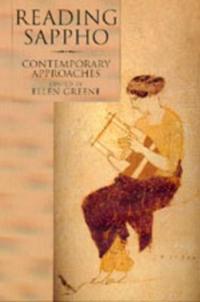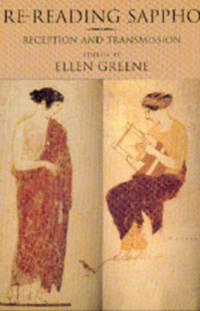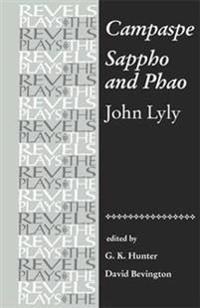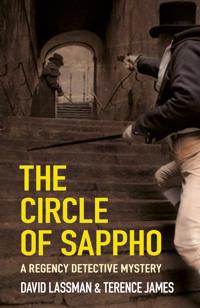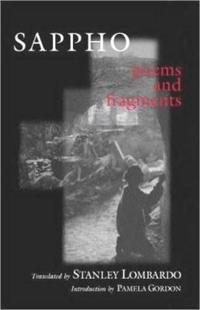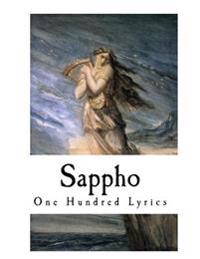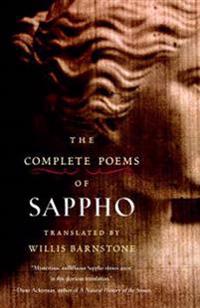Stung with Love: Poems and Fragments of Sappho (Häftad)
avSappho
ISBN: 9780140455571 - UTGIVEN: 2009-08More or less 150 years after Homer's Iliad, Sappho lived on the island of Lesbos, west off the coast of what is present Turkey. Little remains today of her writings, which are said to have filled nine papyrus rolls in the great library at Alexandria some 500 years after her death. The surviving text[...]
If Not, Winter: Fragments of Sappho (Häftad)
avSappho, Anne Carson
ISBN: 9780375724510 - UTGIVEN: 200308Sappho (Pocket)
avSappho
ISBN: 9780520272934 - UTGIVEN: 2012-06-15A collection of poems that presents the woman whom the Greeks consider to be their greatest lyric poet.[...]
Come Close (Häftad)
avSappho
ISBN: 9780141398693 - UTGIVEN: 2015-02'Yes, we did many things, then - all Beautiful...' Lyrical, powerful poems about love, sexuality, sun-soaked Greece and the gods. Introducing Little Black Classics: 80 books for Penguin's 80th birthday. Little Black Classics celebrate the huge range and diversity of Penguin Classics, with books from[...]
Sappho and Alcaeus: An Introduction to the Study of Ancient Lesbian Poetry (Pocket)
avD. L. Page
ISBN: 9780198143758 - UTGIVEN: 1979-10-11Roman Receptions of Sappho
ISBN: 9780198829430 - UTGIVEN: 2019-01Sappho, a towering figure in Western culture, is an exemplary case in the history of classical receptions. There are three prominent reasons for this. Firstly, Sappho is associated with some of the earliest poetry in the classical tradition, which makes her reception history one of the longest we kn[...]
Fictions of Sappho, 1546-1937
ISBN: 9780226141367 - UTGIVEN: 1989-10Considering Sappho as a creature of translation and interpretation, a figment whose features have changed with social mores and aesthetics, Joan DeJean constructs a fascinating history of the sexual politics of literary reception. The association of Sappho with female homosexuality has made her a pa[...]
Lesbian Desire in the Lyrics of Sappho (Inbunden)
avJane Mcintosh Snyder
ISBN: 9780231099943 - UTGIVEN: 1997-03-04The Sappho History (Inbunden)
avMargaret Reynolds
ISBN: 9780333971703 - UTGIVEN: 2003-05In "The Sappho History" Margaret Reynolds traces the story of the reception of Sappho's poetry and her afterlife in literature and art from the mid-18th century. For women writers in the Romantic period, she symbolized possibility; for the young Tennyson, she was a private ancestor helping him make [...]
Searching for Sappho
ISBN: 9780393242232 - UTGIVEN: 2016-03The daughter of an aristocratic family, a wife, a devoted mother and a lover of women, Sappho was one of the greatest writers of her own or any age. Although most people have heard of Sappho, the story of her lost poems and the lives of ancient women they celebrate has never been told for a general [...]
Sappho's Leap (Häftad)
avErica Jong
ISBN: 9780393325614 - UTGIVEN: 2004-05"Sappho's Leap" is a journey back 2,600 years to inhabit the mind of the greatest love poet the world has ever known. At the age of fourteen, Sappho is seduced by the beautiful poet Alcaeus, plots with him to overthrow the dictator of their island, and is caught and married off to a repellent older [...]
Searching for Sappho: The Lost Songs and World of the First Woman Poet (häftad)
ISBN: 9780393353822 - UTGIVEN: 2017-03For more than twenty-five centuries, all that the world knew of the poems of Sappho--the first woman writer in literary history--were a few brief quotations preserved by ancient male authors. Yet those meager remains showed such power and genius that they captured the imagination of readers through [...]
Laughter of Aphrodite, The: A Novel About Sappho of Lesbos (Övrig)
avPeter Green
ISBN: 9780520203402 - UTGIVEN: 1995-12-28Best-selling classicist Peter Green recreates the life and times of the Greek lyric poet Sappho in this beautifully conceived, sharply detailed work of historical imagination. We meet Sappho at the age of fifty, when she is shaken by her fatal and final love affair with Phaon. She narrates her own s[...]
Reading Sappho (Häftad)
ISBN: 9780520206014 - UTGIVEN: 1999-07Reading Sappho considers Sappho's poetry as a powerful, influential voice in the Western cultural tradition. Essays are divided into four sections: "Language and Literary Context," "Homer and Oral Tradition", "Ritual and Social Context", and "Women's Erotics". Contributors focus on literary history,[...]
Re-Reading Sappho (Häftad)
ISBN: 9780520206038 - UTGIVEN: 1999-07Re-Reading Sappho reflects the recent fascination with Sappho's "afterlife." The essays examine the changing interpretations of scholars and writers who have read the fragmentary remains of Sappho's poetry. As the contributors explore the ways that each generation creates its own Sappho, the Sapphic[...]
Campaspe and Sappho and Phao (Storpocket)
avJohn Lyly
ISBN: 9780719031007 - UTGIVEN: 1999-03One of a series of play texts by Elizabethan and Jacobean dramatists other than Shakespeare, this volume discusses the plays "Campaspe" and "Sappho and Phao" by John Lyly. The series aims to throw light on the plays and to offer views of the plays that have been neglected in the past.[...]
The Circle of Sappho
ISBN: 9780750962964 - UTGIVEN: 2016-11When a teacher and pupil are found dead at an exclusive girls' school in Bath, Jack Swann, the Regency Detective, becomes involved in one of the most intriguing cases of his career. Is it a tragic accident, a suicide pact, or murder? As Swann attempts to solve the mystery, his every move is observed[...]
Poems and Fragments (Häftad)
avSappho
ISBN: 9780872205918 - UTGIVEN: 2002-03A new Sappho by a master poet and translator that treats the fragments as aesthetic wholes, complete in their fragmentariness, and which is also, as the translator puts it: "ever mindful of performative qualities, quality of voice, changes of voice...".[...]
Sappho (Inbunden)
avDiane J. (TRN) Rayor, Andre (TRN) Lardinois, Diane J. (TRN) Rayor
ISBN: 9781107023598 - UTGIVEN: 2014-07Sappho, the earliest and most famous Greek woman poet, sang her songs around 600 BCE on the island of Lesbos. Of the little that survives from the approximately nine papyrus scrolls collected in antiquity, all is translated here: substantial poems, fragments, single words - and, notably, five stanza[...]
The Complete Poems of Sappho (Pocket)
avWillis (TRN) Barnstone
ISBN: 9781590306130 - UTGIVEN: 2009-03Sappho's thrilling lyric verse has been unremittingly popular for more than 2,600 years--certainly a record for poetry of any kind--and love for her art only increases as time goes on. Though her extant work consists only of a collection of fragments and a handful of complete poems, her mystique end[...]

